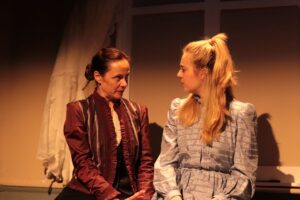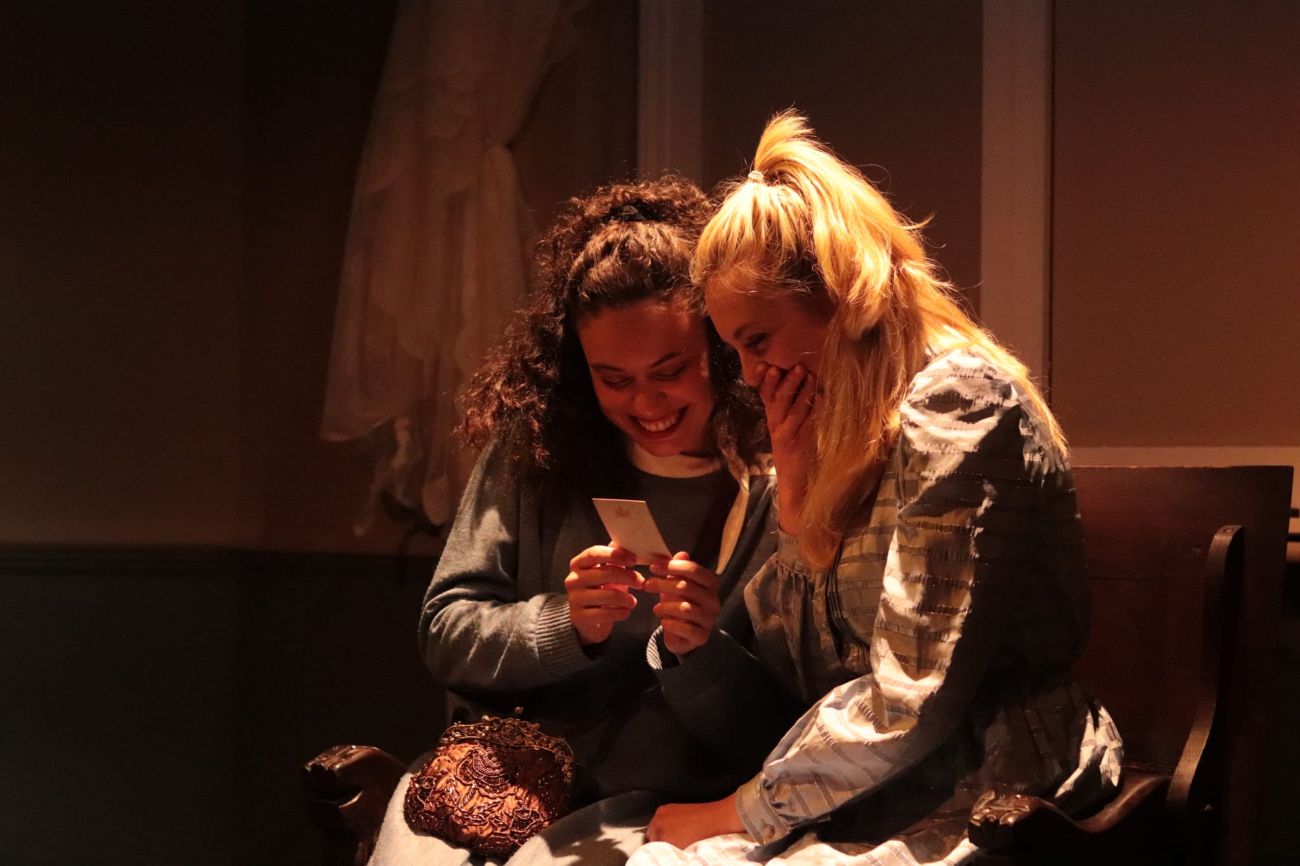Grace-Joy Howarth’s adaptation of Simone de Beauvoir’s posthumously published novella The Inseparables is a poignant, beautifully rendered exploration of love, friendship, freedom, femininity, and loss. Directed with sensitivity by Anastasia Bunce, this production deftly unpacks the emotional and ideological bond between two young women—Sylvie Lapage and Andrée Gallard—drawing from de Beauvoir’s own relationship with Élisabeth “Zaza” Lacoin.
Set between 1917 and 1929, the play unfolds in seamless, cinematic snippets that glide elegantly from one scene to the next. Projected dates on a window-like screen mark the progression of time unobtrusively, reinforcing the narrative’s gentle passage from childhood to adulthood, and deepening the sense of inevitability surrounding its tragic conclusion.
Ayesha Ostler delivers a subtle, deeply felt performance as Sylvie, the more introspective and increasingly self-assured of the pair. Lara Manela brings grace and charisma to the role of Andrée—a gifted violinist, vibrant, but ultimately fragile young woman a gifted, vibrant, but ultimately fragile young woman stifled by social and family pressures. Their relationship forms the emotional core of the play, shifting from intense admiration and shared intimacy to painful ideological and emotional divergence.
Act I, though delicately staged, leans toward the stylised—its emotional register more contained, the performances slightly distanced. Yet this restraint feels deliberate. In Act II, the dynamic deepens: Sylvie grows more grounded, while Andrée slowly unravels under the weight of expectation. What begins as an idyllic coming-of-age story gives way to something quieter, sadder, and far more complex.
The contrast between the characters is not only emotional but visual. The costume design by Grace-Joy Howarth herself highlights this beautifully. Andrée’s wardrobe is elegant and refined, befitting a young woman from a well-to-do Catholic family. Her various outfits mirror her status and her mother’s expectations. Sylvie’s clothing, by contrast, is simpler and less traditionally feminine—subtly underscoring her emotional restraint and eventual philosophical divergence from Andrée. While Andrée experiments with lipstick and tries smoking, Sylvie remains observant, grounded, and increasingly skeptical—not only of the Church but of the entire structure of obedience that binds them both.

Sylvie’s journey from devout Catholicism to atheism is subtly and convincingly portrayed. Her spiritual awakening mirrors her intellectual coming-of-age and becomes the foundation of her emotional resilience. Her belief in the necessity of freedom and self-definition stands in stark contrast to Andrée’s growing fragility, which is exacerbated by an overbearing mother and an uncommitted suitor.
Caroline Trowbridge gives a powerful and versatile performance in three roles: the domineering Madame Gallard (Andrée’s mother), the stern schoolteacher, and Madame Blondel. In each, she embodies the suffocating expectations society places on women. Her portrayal of Madame Gallard is particularly impactful: a woman who does not openly suppress her daughter’s desires but redirects them—engineering a polite exile to Cambridge to avoid scandal and control the outcome. This dynamic encapsulates what de Beauvoir called “social slavery”—a power structure in which both mother and daughter are entrapped.

Alexandre Coster-Barmada takes on very different roles— as Abbé Dominique, the priest who embodies the spiritual framework Andrée tries to live by, and Pascal Blondel, the man she falls in love with. These two characters that leave indelible marks on her life, shaping and ultimately stifling her emotional life and desire for freedom. Coster-Barmada’s Pascal is true to his character, projecting a weak, hesitant, and ultimately unable to commit to the relationship—citing academic obligations and a desire not to upset his mother. His passivity is not malicious, but it is consequential, and it becomes one of many quiet forces contributing to Andrée’s psychological collapse.
Music plays a crucial role in evoking the characters’ interiority. Flick Isaac-Chilton’s sound design is beautifully interwoven with the narrative. The score ranges from the sensual Impressionism of Debussy and Ravel—mirroring Sylvie’s inner awakening—to the formal clarity of Poulenc, which echoes Andrée’s craving for order. Sacred works such as Miserere and Cantique de Jean Racine speak to the inescapable presence of Catholicism in her life, while a brief touch of Elgar hints at the English escape that never quite materialises. One particularly affecting moment, the “tulips scene,” pairs aching music with silences more expressive than speech—an emotional crest in a play defined by quietude.
Andrée’s eventual breakdown is never fully explained. The causes are many—thwarted love, a controlling upbringing, repressed desires. The play allows this ambiguity to linger. Her death becomes a metaphor for the cost of emotional and intellectual repression, the price of living under a structure that does not allow women the space to become themselves.
The Inseparables is more than a biographical drama—it’s a study of a time, a system, and the impossible choices young women were forced to make. Howarth’s script and Bunce’s direction capture the nuance of de Beauvoir’s world and her grief-laced admiration for Zaza. This is a moving and masterfully staged piece of theatre—intimate, intelligent, and profoundly humane.
By Grace Joy Howarth
Based on a novel by Simone de Beauvoir
Director: Anastasia Bunce
Translation by Lauren Elkin
Cast includes: Ayesha Ostler, Lara Manela, Caroline Trowbridge and Alexandre Coster-Barmada
Until: 10 May 2025
Duration: 2hrs including an interval of 15 mins
Photo credit: Stuart Ray

